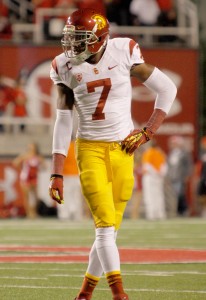Penalties might be the Trojans’ downfall
Remember how Arizona State unraveled a year ago? A promising beginning to the 2011 season, punctuated by a 43-22 victory over USC in the fourth week, quickly spiraled into mediocrity as the Sun Devils lost their final five games.
You didn’t need to be a college football pundit to determine the source of their woes: a lack of discipline.

Cheap shot · In 2011, senior safety T.J. McDonald was suspended for the first half of the game against Colorado for “head-hunting” receivers. – Carlo Acenas | Daily Trojan
More specifically, the Sun Devils finished 120th in the Football Bowl Subdivision in penalty yards per game; I might add that the FBS only fielded 120 teams in 2011.
This unfortunate distinction effectively doomed former coach Dennis Erickson’s career in Tempe, completing a five-year stretch in which his teams, outside of a middling 76th finish in his first year, never finished better than 108th in the nation in penalty yards per game. By the end of Erickson’s tenure, the patients were undeniably running the asylum.
In advance of last season’s matchup at Arizona State, USC then-junior quarterback Matt Barkley famously called out middle linebacker Vontaze Burfict, who earned a whopping 17 personal fouls in his career, as a dirty player who seeks to injure opponents intentionally. Barkley later earned Pac-12 Commissioner Larry Scott’s reprimand for stating the obvious, levying a character attack on a fellow Pac-12 player.
Now that Arizona State is only averaging 4.5 penalties per game and Burfict has played his way out of the 2012 NFL draft’s first round and into undrafted free agent status, who is the NCAA’s most penalized football team, you might ask? Who is no. 120, if you will?
The statistics don’t lie: It’s No. 10 USC. The Trojans average 10 penalties per game — more than double the number the incumbent bad boy Sun Devils post. In fact, USC’s 78.3 penalty yards per game is essentially on par with 2011 Arizona State’s 79.8 figure, which was universally panned as outrageous at the time.
Now, USC isn’t a dirty team — just undisciplined. Perhaps the only Trojan with a reputation as a head-hunter is senior safety T.J. McDonald, who was suspended for the first half of USC’s 42-17 victory over Colorado last season for repeated targeting of defenseless receivers.
Reviewing the distribution of USC’s penalties this season, sloppiness on offense is the greatest offender. Of the team’s 60 penalties, 29 have come on either a delay of game, false start or holding penalty.
Responsibility for these types of penalties falls primarily on the quarterback and offensive line, which is surprising because USC returns five of six starters from the 2011 group, the only change being offensive tackle Aundrey Walker instead of 2012 NFL first-round draft pick Matt Kalil. Walker also just so happens to be the most heavily penalized player on the team — a development that has forced USC coach Lane Kiffin to open up his spot for competition with freshman Max Tuerk.
One would expect a return to the Coliseum would help solve many of these issues, as crowd noise on the road drowns out Barkley’s cadences and can contribute to false starts and delay of games, but USC has essentially taken penalties at an equal clip at the Coliseum and away — eight per game at home compared to 11 on the road.
Though personal foul penalties — those most commonly associated with dirty teams — are still problematic, they have ultimately not been as much of an issue for USC.
But toss in four more substitution infraction penalties, and it’s clear that a veteran USC offensive unit is, for some inexplicable combination of reasons, struggling to just line up correctly and snap the ball.
To be honest, I’m baffled. There’s no way to rationalize this number of penalties. What can be said, however, is that USC’s final box scores would look a lot more commensurate with the games we watched if the Trojans buckled down and didn’t take so many penalties.
What can also be said is that USC’s current pace is bad news if it genuinely considers itself a top-tier team with BCS bowl aspirations. There’s absolutely no chance of beating No. 3 Oregon if the Trojans take 14 penalties like they did against Utah.
The 2011 Arizona State team collapsed under the weight of its inattention to detail and selfish penalties after the play. With the meat of its schedule finally here, USC needs to reverse course quickly unless it also wishes to experience a similar downward trajectory.
“Leveling the Playing Field” runs Fridays. If you would like to comment on this story, visit DailyTrojan.com or email Sean at [email protected].
